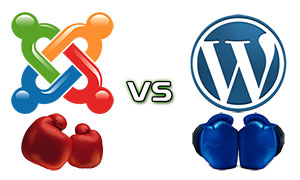Joomla vs WordPress Round 1 – Similarities
 To keep up with the times, most websites need a Content Management System (CMS) with database integration to be able to store and retrieve data based on what the client interacts with on the website. Most of the average users out there think that using a CMS is a very expensive idea. Truth is, there are several open source CMS systems available that are free to install on your web hosting space and use. Of the CMS options available, the 2 largest and most supported Content Management Systems are Joomla! and WordPress.
To keep up with the times, most websites need a Content Management System (CMS) with database integration to be able to store and retrieve data based on what the client interacts with on the website. Most of the average users out there think that using a CMS is a very expensive idea. Truth is, there are several open source CMS systems available that are free to install on your web hosting space and use. Of the CMS options available, the 2 largest and most supported Content Management Systems are Joomla! and WordPress.
The similarities between the two:
Database Connectivity – There is no surprise here as all CMS systems require this to function. Databases allow for dynamic, user driven content, and the ability to retrieve input from the user.
PHP Scripting – Both WordPress and Joomla! use PHP server side scripting as the programming language of choice, so make sure your hosting has PHP installed.
MySQL – MySQL is the database language used by the two CMS options, so MySQL will need to be enabled on your web hosting server as well.
Thousands of Extensions – Since both CMS systems are supported at incredible levels by developers, each CMS has its own set of extensions. Extensions are little plug-ins that extend the functionality of your website past its basic capability.
Multi Language Support – Don’t speak English? Then you may have trouble reading this article! All kidding aside, both WordPress and Joomla! are supported with dozens of downloadable language packs to help spread your website internationally.
Lots of Support – If you are not sure how to get started, there are many books, online manuals, websites, and support forums available to help. The official forum for Joomla! is http://help.joomla.org/. The official forum for WordPress is http://wordpress.org/support/.
WYSIWYG Editor – Both CMS systems come with a What-You-See-Is-What-You-Get (WYSIWYG) editor built in, allowing you to build your web articles without knowledge of HTML. Keep in mind that these editors are basic, and you will need to install more advanced editors for more advanced features.
Blogging & RSS – Both Joomla! & WordPress come with the Blog Category style of website design functionality as part of its core programming, with RSS automatically thrown in to the mix.
Administration Panel – All CMS systems come with an Admin Panel, so there is no surprise here. The Admin Panel is web software that allows Administrators access to the backend of their websites. The GUI (Graphical User Interface) makes it easy to add/remove pages, extensions, menu items, media, posts, articles, modules, and plug-ins from the website, all without having to go in and manually remove code from the existing pages.
Search Engine Friendly URLs (SEFs) – Both Joomla! & WordPress have the ability to change the PHP generated URL into something readable in words. This is excellent when considering that search engines and people get nothing out of numbers and special characters. Keep in mind that Joomla! users will have to rename their .htaccess file for this to work. This extra step is more of a pain, but is more secure for users who don’t use SEFs. Most website attacks I’ve encountered have hurt the website through the .htaccess configuration.
Shopping Cart Software – Both Joomla! & WordPress have shopping cart choices. However, they are limited. Virtuemart for Joomla! and WP e-Commerce for WordPress are the only two worth looking at if you are searching for a complete e-commerce solution.
So these are the similarities between the two Open Source CMS Systems. This round is a draw! So how do you choose which to use? Come back tomorrow, for a weigh in on the pros & cons of Joomla!
Joomla Vs. WordPress – Round 2 – Joomla!




